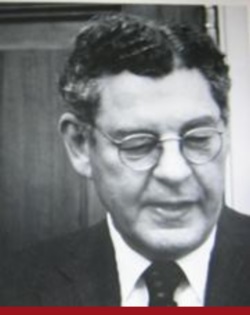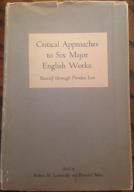http://www.nytimes.com/1987/04/05/obituaries/robert-lumiansky-a-medieval...
1913–1987
Robert Mayer Lumiansky was born in Darlington, South Carolina in 1913. He graduated in 1933 with a B.A. and a commission as a second lieutenant in the United States army. He was a professor of English at Tulane University, Duke University, University of Pennsylvania and at New York University. Outside the university world, but still squarely within the world of the humanities, he served for 18 years as a Senator of the United Chapters of Phi Beta Kappa, 15 years as a member of its Executive Committee, and ultimately as its President. He was a Fellow of the Medieval Academy of America and served also as its President. He was an original member of the Board of Trustees of the National Humanities Center, on which he remained until his death. Lumiansky was elected Chairman of the American Council of Learned Societies in 1959 and, upon the retirement of Fred Burkhardt in 1974, became its President. He was President of the ACLS until 1982, and in 1985 returned for a year as President pro tempore.
Lumianksy was critical in the establishment of the National Endowment for the Humanities. He was appointed a member of the first Council of the NEH and as a member of President Reagan’s 1981 Task Force on the Arts and the Humanities where he helped to resist calls for the abolition of the NEH. With prompting from Lumiansky, the US Congress recognized the public role of ACLS by awarding it a Congressional charter in 1982.
Eight universities awarded him honorary degrees and he was a recipient of the Phi Beta Kappa Award for Distinguished Service to the Humanities. He was a Fellow of the American Academy of Arts and Sciences, a member of the American Philosophical Society, and a Chevalier of the Legion of Honor. He published important critical studies of Chaucer and Malory, translations into modern English of the Canterbury Tales and of Troilus and Criseyda, and a magisterial two volume critical edition of The Chester Mystery Cycle, which was completed just two years ago. At the time of his death, he was engaged in the preparation of a comparable critical edition of Malory.

 Department of English
Department of English

